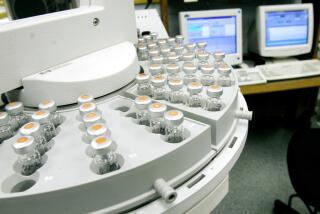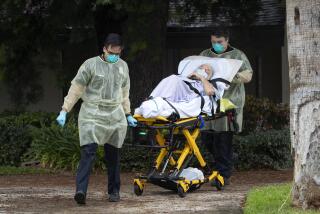Medical Lab Oversight Criticized
- Share via
WASHINGTON — The government agency charged with overseeing the quality of testing in medical laboratories has failed to ensure that even serious repeat deficiencies are cited and corrected, federal auditors said Tuesday.
A 93-page report by the Government Accountability Office concluded that the Centers for Medicare and Medicaid Services, or CMS, had not enforced the minimum standards required by law and could not properly judge whether a lab’s quality had improved or worsened.
Because of wide variation in the way inspections are conducted by the dozens of state agencies and private accrediting bodies certified by CMS, the report said, it is virtually impossible to get a realistic picture of lab quality.
In response to the findings, Medicare Administrator Mark B. McClellan said he was convinced that despite a recent increase in laboratory failures, “the overall performance of all labs has improved, especially when viewed over a longer period of time.”
The report was requested last year by Reps. Elijah E. Cummings (D-Md.) and Mark Souder (R-Ind.). Cummings’ district is home to Maryland General Hospital, whose laboratory is one of the few to be cited by CMS in recent years for serious deficiencies -- but only after whistle-blower complaints about the use of malfunctioning equipment for HIV testing.
In looking at lab inspectors nationwide, the GAO found that even when violations were found, sanctions -- which can include fines or decertification -- often were not imposed.
The report also said that CMS had not ordered that labs be tested in key basic proficiencies at least four times a year, as required by a 1988 statute. It also cited the federal government for failing to conduct timely reviews of its surrogate inspectors, for inconsistency in the review standards, and for emphasizing inspections as an educational tool, rather than as a way to enforce standards.
While CMS officials blamed some of the problems -- such as delays of up to four years in performing required reviews -- on lack of staff and budget, the GAO found that the fees collected from healthcare providers for the inspection program far exceeded the amount being spent. The report noted that CMS had accumulated a surplus of $70 million but did not request any staff increases.
McClellan disputed the conclusion that enforcement had been sacrificed in the effort to educate lab operators.
“The CMS educational approach does not mean that surveyors refrain from identifying deficiencies,” he wrote in response to questions about the report.
But Leslie G. Aronovitz, the GAO’s director of healthcare, said that CMS had at times “bent over backward” to help labs avoid sanctions.
Officials of the College of American Pathologists, which performs thousands of hospital lab inspections, said they had taken steps to ensure that most inspections were performed without notice. The report noted that routine advance notification had produced questionable results.
The report also criticized the pathologists’ group for allowing volunteer laboratory employees to inspect competing facilities. The report said such workers were subject to conflicts of interest and had not been adequately trained. Two surveyors interviewed by the GAO said they had never bothered with training because it was optional. Others said they never were told that training was available.
In its reply, the pathologists’ organization said a mandatory training program was being planned for 2007.
More to Read
Sign up for Essential California
The most important California stories and recommendations in your inbox every morning.
You may occasionally receive promotional content from the Los Angeles Times.













